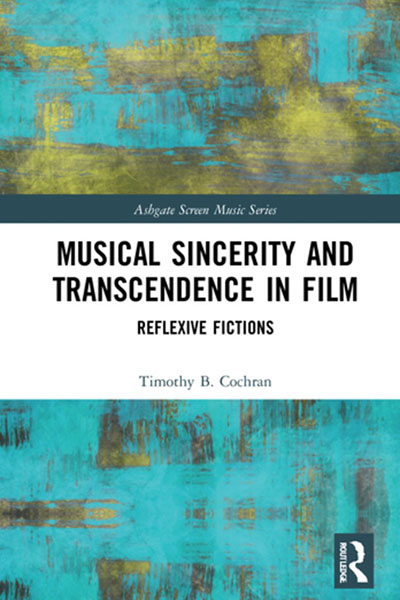- Apply
- Visit
- Request Info
- Give
Cochran publishes book on music in film
Written by Molly Boucher
Published on September 13, 2021

Eastern Connecticut State University music professor Timothy Cochran recently published a book titled “Musical Sincerity and Transcendence in Film.” The book, which analyses the impact of music in films, was published by Routledge, a multinational publishing company that specializes in academic journals, books and online resources.
Originating as a study of a multitude of different film genres and issues, Cochran’s work developed into an analysis of the activities that corresponded with a film's music such as dancing, singing and having memories activated.
Over time, his research developed and took on a life of its own, growing from the simple inclusion of musical moments, to what those decisions say about the pieces selected for the scene they are in, and what this says about the way the musical piece is viewed.
From there, Cochran explored the historical roots of these ideas. “It was exciting to analyze music’s role in these film scenes,” says Cochran, “but even more so to connect those analyses to broader historical, cultural, philosophical and musical issues as the book’s broader themes took shape--those themes being how filmmakers frame music as a way of pursuing sincere human connection and transcendent experiences.”

Broken up into six chapters, the book analyses films such as “Eternal Sunshine of the Spotless Mind,” “Moonrise Kingdom,” “WALL-E” and “The Sound of Music.” Using famous pieces such as Claude Debussy’s “Claire de Lune” and Franz Schubert’s “An die Musik,” Cochran stresses the significance of these examples, saying, “Filmmakers use music as a way of expressing and exploring human desires for sincerity and transcendence. Music can be a particularly potent way of articulating and revealing those desires, and the book shows how filmmakers use music in this way.”
Along with the progression of his research and writing, Cochran is active as a member of Eastern’s teaching faculty. He finds that by continuing his research, he can connect his findings to what he teaches students. With classes focusing on popular, classical and film music, he holds unique outlooks on his students’ research and writing processes, as they parallel his own work. Cochran also says he finds teaching and research interconnected, saying, “I’m a better teacher when I’m doing research because I’m practicing asking the kinds of questions and doing the kinds of analysis that I teach my students to do.”
However, this doesn’t mean he wants his work limited only to the music field. “I hope the eclecticism serves a broad audience of people interested in film music,” explains Cochran. He also has found that his research is relevant to current times, as we continue to face the COVID-19 pandemic. The examination of the major themes of his books, especially through a musical lens “will resonate with people during our era of COVID and other forms of instability where a lot of people are feeling disconnected and lonely, wishing for life to be back to normal, and questioning where hope and meaning come from.”


